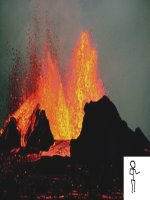English 10 UNIT 9 GETTING STARTED
Bạn đang xem bản rút gọn của tài liệu. Xem và tải ngay bản đầy đủ của tài liệu tại đây (2.83 MB, 24 trang )
Welcome to our class, 10 A1 !
1. What can you see in the video?
2. Why didn’t I feel cold even if I
was standing on a polar ice cap?
3. How do you feel when watching
the video?
Unit 9. PRESERVING THE ENVIRONMENT
Lesson 1: GETTING STARTED
Environmental impacts
Task 1. Listen and read.
Nam’s father: What are you doing, Nam?
Nam: I‘ll do it right now... Oh, yes,
you’re
correct.
Nam: I’m writing for my school newsletter.
Nam’s father: But why are you
interested in
Nam’s father: What are you writing?
environmental
impacts?
Nam: Well, the editor asked me to write a
Nam: Well, I think if we can see the
letter giving some practical advice on
environmental impacts, we’ll
know
environmental preservation. So far, I
how to protect the environment
from
haven’t had any ideas!
many threats such as
deforestation,
Nam’s father: Have you used the web search
pollution, global warming and
fossil
engine to find any information?
fuel depletion.
Nam: Yes, I have. However, it was confusing
Nam’s father: Correct! Air
pollution, the
because I got too many search
greenhouse effect and global
results and web pages about
warming have a negative
impact
the environment.
on the environment. As a result,
polar ice
Nam’s father: Well, read all of them quickly for
is melting and sea levels are
Task 2. Label the photos with the words and phrases from the box .
Then use a dictionary to check their meaning.
pollution
polar ice melting
fossil fuels
greenhouse effect
deforestation
global warming
f
Task
2. Label the photos with
and phrasesfossil
from the
box .
pollution
polartheicewords
melting
fuels
Then
use a dictionary
their meaning.
greenhouse
effect to check
deforestation
global warming
e
f
The meanings of the words
- Pollution: The harmful substances that cause damage to water,
/pə'lu:∫n/ the air, etc.
- Polar ice melting: The state where ice in the polar turns into liquid
/'pəʊlə /ais/ /'meltiŋ/ (water) because of extreme temperature.
- Fossil fuels: Fuel such as coal or oil that is formed from
/fɔsl//ˈfjuəl/ the decayed remains of plants or animals.
- Greenhouse effect:
/´gri:n¸haus/ /i'fekt/
The warming of a planet's surface and lower
atmosphere caused by trapped solar radiation
- Deforestation: The destruction of forests by people
/di¸fɔris´teiʃən/
- Global warming: A gradual increase in world temperatures
/´gloubl/ /'wɔ:miɳ/ caused by gases such as carbon dioxide
Task 3. Read the conversation between Nam and his
father again. Ask and answer the following questions.
•
•
•
•
•
1. What is Nam doing for the school newsletter?
2. What did the editor ask Nam to write about?
3. What does “environmental impacts” mean?
4. Why is Nam interested in environmental impacts?
5. Name the threats to the environment mentioned in the
conversation.
• 6. What is the biggest threats to the environment in your
neighborhood?
The Big Wheel
Team Scores
80
Team One
190
Team Two
Spin Wheel
Points
1 2 3 4 5 6
1. What is Nam doing for the school
newsletter?
→ He is writing a letter for the school
newsletter.
2. What did the editor ask Nam to write
about?
→ The editor asked Nam to write some
practical advice on environmental
preservation.
.
3. What does “environmental impacts”
mean?
→ It means the negative influence or effect
on the environment.
4. Why is Nam interested in environmental
impacts?
→ Because he thinks if we can see the
impacts on the natural environment, we will
know how to protect it.
5. Name the threats to the environment
mentioned in the conversation.
→ They are deforestation, pollution, global
warming, fuel depletion, polar ice melting
and the rise of sea levels.
6. What is the biggest threats to the
environment in your neighborhood?
→ Deforestation/pollution/river filled with
rubbish and plastic bags/using too much
pesticides….
Task 1. Listen and read.
Nam’s father: What are you doing, Nam?
Nam: I‘ll do it right now... Oh, yes,
you’re
correct.
Nam: I’m writing for my school newsletter.
Nam’s father: But why are you
interested in
Nam’s father: What are you writing?
environmental
impacts?
Nam: Well, the editor asked me to write a
Nam: Well, I think if we can see the
letter giving some practical advice on
environmental impacts, we’ll
know
environmental preservation. So far, I
how to protect the environment
from
haven’t had any ideas!
many threats such as
deforestation,
Nam’s father: Have you used the web search
pollution, global warming and
fossil
engine to find any information?
fuel depletion.
Nam: Yes, I have. However, it was confusing
Nam’s father: Correct! Air
pollution, the
because I got too many search
greenhouse effect and global
results and web pages about
warming have a negative
impact
the environment.
on the environment. As a result,
polar ice
Nam’s father: Well, read all of them quickly for
is melting and sea levels are
Task 4. Work in pairs. Discuss the following
question.
Which of the following threats to the environment are you
most concerned about?
Why?
Pollution
Polar ice melting
Fossil fuels
Threats
Greenhouse effect
Deforestation
Global warming
Example
A: We have just learnt about the environmental impacts and the
threats to our environment. Which of the threats are you most
concerned about?
B: The image of the polar bear trying to survive on a tiny piece of ice
makes me concerned most because it looks so miserable. If all of the
ice melts, the polar bears will definitely die.
A: Deforestation affects me the most because it not only damages
nature and animal habitats but it also releases harmful Co2 into the
atmosphere.
B: So we must take actions to protect our environment.
Invironmental
impacts
Preserving the
environment
Threats to the
environment
Homework
Review the contents that have
been covered in the lesson.
Make sentences with the words
and phrases you have learnt in the
lesson and find their stress
patterns in a dictionary.
Find the sentences in the
conservation that contain reported
speech.
Prepare for “Unit 9: Language”









